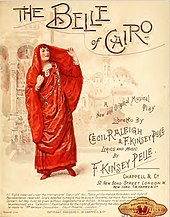Kinsey Peile
[5] He joined the company of the actor-manager George Alexander, first on tour and then at its London base, the St James's Theatre, appearing in Liberty Hall and other productions, including the premiere of The Importance of Being Earnest, in which he created the role of Lane.[6] Peile's post-war roles included Otho in the Čapeks' The Insect Play in 1923, alongside the young John Gielgud, Pauncefort Quentin in Noël Coward's The Vortex (1924),[n 3] and Richard Twining in Maugham's The Moon and Sixpence (1925).His works written for the West End included Solomon's Twins, 1897; An Interrupted Honeymoon, 1899; Lyre and Lancet, 1902; The Man Who Was, 1903; Money and the Girl, 1910; Bill, Twelve o'clock, and The Shooting Star, all 1912; The Pink Nightgown, 1913; and Who Laughs Last, 1919.[9] In the view of The Era, Peile was best known for his adaptation of Rudyard Kipling's story "The Man Who Was", which Herbert Beerbohm Tree mounted with considerable success at His Majesty's in 1903 and revived frequently.[11] Peile appeared in films, including The Face at the Window (1920), Three Live Ghosts (1922), The Presumption of Stanley Hay, MP (1925), Settled Out of Court (1926), The Vortex (1928), The Burgomaster of Stilemonde (1929) and High Society (1932).


Allan AynesworthThe Importance of Being EarnestOscar WildeNoël CowardHenrik IbsenSomerset MaughamWest EndAllahabadWimbledon, LondonQueen's Royal Regiment (West Surrey)Welch RegimentOpera ComiquePost Office RiflesMax BeerbohmRudyard KiplingPrince of Wales's TheatreGeorge AlexanderSt James's TheatreLiberty HallThe TimesHedda GablerFirst World WarČapeks'The Insect PlayJohn GielgudThe VortexRichard of BordeauxNew Theatremusical comedyCecil RaleighMay YohéGiulia WarwickThe EraHerbert Beerbohm TreeHis Majesty'sRobert Louis StevensonAlgernon BlackwoodThe Face at the WindowThree Live GhostsThe Presumption of Stanley Hay, MPSettled Out of CourtThe Burgomaster of StilemondeWho's Who in the TheatreAncestry UKIrene VanbrughOperetteSarah BernhardtMander, RaymondJoe MitchensonSheridan Morley